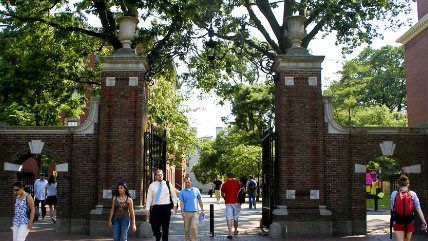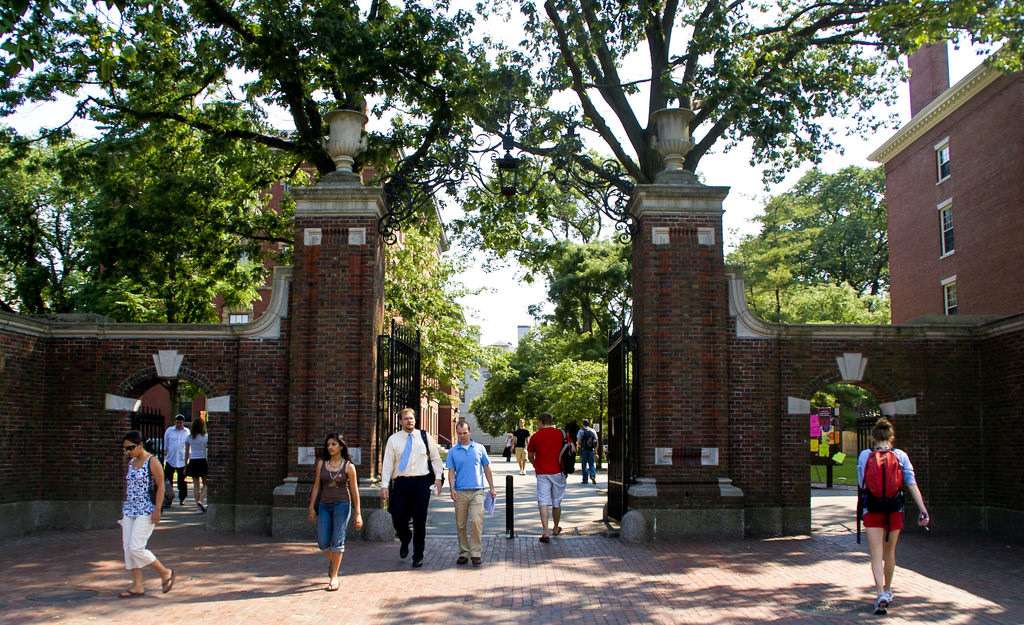One in 375 Women May Be Victims of Campus Rape at Harvard
Nearly one in five Harvard rape reports determined to be unfounded.


The number of rapes reported by students at Harvard University's Cambridge campus "nearly doubled" between 2013 & 2014, according to an article in school paper The Harvard Crimson. This alarming info comes via the new campus-security report from Harvard police, compiled as part of federal Clery Act requirements. But like so much related to campus rape numbers, this seemingly drastic increase isn't nearly as alarming as some will make it out to be.
First, it's important to consider concrete sexual assault numbers, which were still quite low. In 2014, 33 instances of rape were reported to either campus police, university officials, or local law enforcement by students at Harvard's main campus in Cambridge, and one rape was reported at Harvard's Longwood campus. For purposes of the report, rape is defined as "the penetration, no matter how slight, of the vagina or anus with any body part or object, or oral penetration by a sex organ of another person, without the consent of the victim." The number of rapes reported at Harvard last year is up from 17 incidents in 2013, and 24 in 2012.
But as Ashe Schow points out in the Washington Examiner, six of the 2014 rape reports—nearly 20 percent—were determined to be "unfounded," i.e. "false or baseless." This leaves us with just 28 credible rape reports at Harvard last year. Using that number, there were some four to 11 more instances of rape at Harvard last year compared to the two previous years (for which data on the number of unfounded incidents is not available). When you put it like this, the situation doesn't sound quite as alarming as the campus rape rate "doubling" last year.
And it's possible that the increase doesn't even reflect a real rise in sexual violence. Considering the extensive attention paid to campus rape over the past few years (by school administrators, student activists, the media, and the Obama administration) and the fact that the Harvard police survey measures only reported rapes, the increase could actually reflect a positive development: more victims coming forward about their assaults.
In any event, with a population of about 21,000 students, Harvard University's rape rate for 2014 was about 0.13 percent, or one in every 750 Harvard students.
The campus-crime report does not include a gender breakdown for rape victims, but let's just assume for the sake of further extrapolation that all 28 were women. Roughly half the Harvard University student body is women. If we count both graduate and undergraduate students, that's a rape rate of about 0.27 percent for female Harvard students, or one in every 375 Harvard women.
There are about 6,400 undergraduate students at Harvard, and about half are women as well. If we assume all the reported rape victims were undergraduate women—a not baseless assumption, considering only one incident of rape reported between 2012-2014 did not take place in a residence hall (though of course these aren't exclusively undergrad housing)—that leaves us with a rape rate of about 0.88 percent.
In other words, this worst-case-scenario assumption means that about one in 114 female undergraduates reported rapes at Harvard last year. I hate making caveats like "even this is too many," because compared to an optimal level of rape (zero), of course it is. But while this study shouldn't diminish the seriousness of any individual rape, one in 114 is a far cry from the numbers we usually hear from campus rape activists.
This can be partially explained by the fact that many victims don't report sexual assaults to police or campus authorities; while the Harvard police study measured only rapes reported in some form, surveys on campus rape generally focus on incidents whether they were reported to anyone or not. However, these studies also tend to broaden the definition of sexual assault to include everything from an unwanted kiss to unwanted comments about physical appearance. This makes for higher sexual violence numbers—a study released in September, for instance, found that nearly one-third of female undergraduates at Harvard had been victims of broadly defined "unwanted sexual contact"—but also makes their conclusions every bit as suspect and incomplete than estimates that rely solely on rapes reported to police.

Show Comments (65)